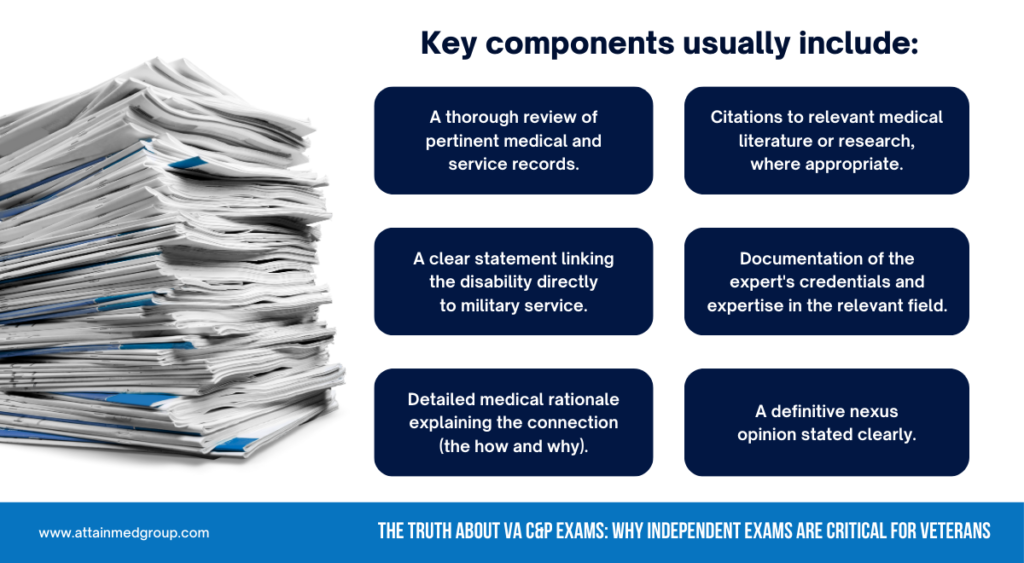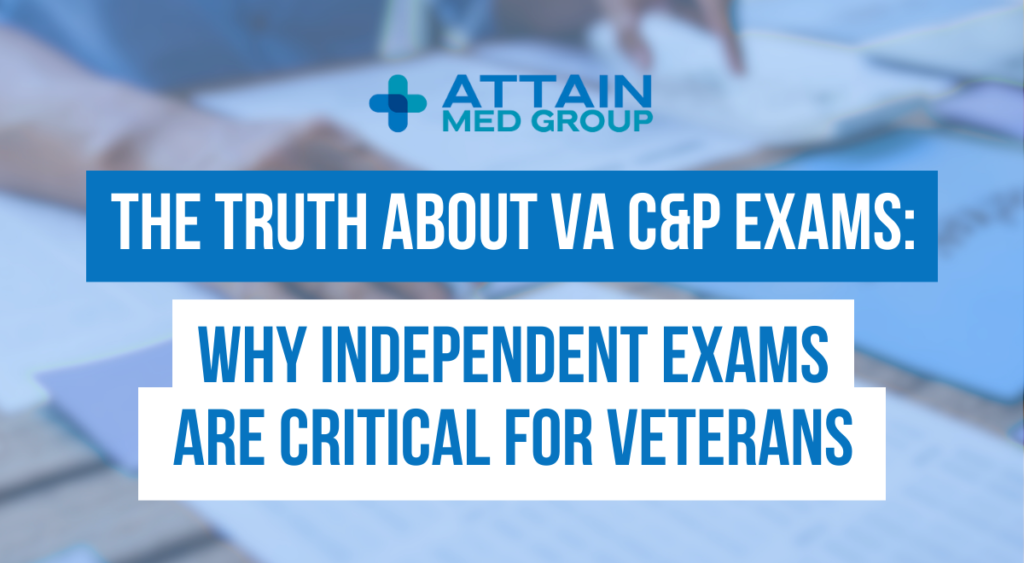Filing a VA disability claim can feel like a significant undertaking. You served your country, faced numerous challenges, and now deal with the long-term effects on your health. Securing the disability benefits you rightfully earned often depends heavily on one crucial step: the Compensation & Pension (C&P) exam.
Unfortunately, many disabled veterans find this part of the VA claims process frustrating and unclear. You might leave the exam feeling the examiner didn’t fully grasp your veteran’s condition or its true connection to your service. This brings us to The Truth About VA C&P Exams: Why Independent Exams Are Critical for Veterans.
You might question if the C&P exam genuinely aims to help your VA claim. Sometimes, it can feel more like an obstacle than assistance. Understanding how these exams operate, their potential shortcomings, and how independent evidence strengthens your case is vital for any veteran pursuing VA disability benefits.
What Exactly is a VA C&P Exam?
Let’s clarify the basics. A C&P exam is a medical examination requested by the Department of Veterans Affairs (VA). Its primary function is to gather medical information to assist in deciding your VA disability claim. A VA-contracted doctor, physician assistant, or occasionally a VA staff clinician conducts this exam.
Consider it the VA’s method for getting a current snapshot of your health related to your benefits claim. The examiner typically reviews your service treatment records, other private medical evidence you’ve submitted, and your claims file (C-file). During the appointment, they will likely ask about your symptoms, how the veteran’s condition affects your daily activities, and details about your military service connected to the condition.
The examiner might perform a physical assessment or order specific tests, depending on the disability you’ve claimed. From the VA’s viewpoint, the objective is to get an impartial assessment of your veteran’s claimed condition. This includes its severity and, critically, establishing service connection – proving it’s linked to your time in service.

Why VA C&P Exams Sometimes Fall Short
While C&P exams are standard in the VA claims process, they are not always flawless. Many veterans report feeling hurried during these appointments. Examiners often manage tight schedules, evaluating numerous veterans daily, which might not allow enough time for an accurate assessment of complex medical histories.
Another frequent concern is the examiner appearing disinterested or skeptical about the veteran’s claimed issues. It’s important to remember these examiners are usually contractors or VA employees working for the same entity deciding your claim. While objectivity is expected, some veterans feel the medical provider isn’t truly digging deep enough or acting as an advocate for understanding their situation.
Furthermore, the C&P examiner has likely never treated you before this single encounter. They lack the long-term perspective on your health journey that your regular healthcare provider possesses. Their report relies on this one interaction and available records, potentially missing the full picture, especially for fluctuating conditions or those with subtle symptoms like some forms of traumatic brain injury (TBI).
The examiner might also lack highly specialized knowledge. While they are medical professionals, they may not be experts in the specific field relevant to your VA disability claim, such as complex neurological disorders, specific mental health conditions, or the long-term effects of exposures like Agent Orange. This potential gap in expertise could lead to misunderstandings or an incomplete evaluation within the decision-making process; you can learn more about VA claim exams on their official site.
The Truth About VA C&P Exams: Why Independent Exams Are Critical for Veterans
This is where the essential “truth” emerges for many veterans navigating the complex disability claims process. Depending solely on the C&P exam results can be a gamble for your VA benefit. If the C&P examiner provides an unfavorable opinion—doubting your condition’s severity or its link to service—it can seriously damage your claim, potentially resulting in denial or a lower VA disability rating than warranted.
This situation underscores why independent medical evidence holds such immense value. Obtaining medical evaluations and opinions from doctors outside the VA system provides a crucial counterbalance. These independent experts are not contracted by the VA for examining claimants; their primary focus is delivering an accurate medical assessment based on their expertise and a detailed review of your specific case and medical documents.
Possessing strong, independent medical evidence shifts more control back to you, the veteran. It demonstrates to the VA that you have diligently gathered support for your claim from qualified professionals who carefully considered your circumstances. This independent medical examination often becomes the critical factor that tips the decision-making process in your favor, particularly when C&P exam results are unfavorable or inconclusive for VA compensation.
The Power of Independent Medical Exams (IMEs)
An Independent Medical Exam (IME) is an evaluation conducted by a private physician not previously involved in your care and not affiliated with the VA for claim examination duties. The objective is to obtain an unbiased, expert opinion regarding your medical condition. This physician usually performs a comprehensive review of your medical records, including service files and private treatment notes, before conducting the examination.
View the IME provider as a neutral, expert third party bringing fresh eyes and specialized knowledge. If your VA disability claim involves a heart condition, consulting an independent cardiologist for an IME is logical. Their specialized report, considered strong private medical evidence, can carry substantial weight when the VA assesses your claim and determines a VA rating.
The IME report thoroughly details the doctor’s findings, diagnosis, the severity of your condition, and their professional opinion on its connection to your military service. A well-crafted IME can directly counter negative C&P exam findings or address gaps left by the VA’s examination. It serves as powerful evidence bolstering your pursuit of disability compensation.
Understanding Nexus Letters: Bridging the Gap
Often even more critical than an IME is the Nexus Letter. A Nexus Letter is a specific medical opinion written by a qualified medical professional, explicitly connecting your current disability to an event, injury, or illness during military service. This letter establishes the essential “nexus” or link required for the VA to grant service connection for disability benefits.
Achieving service connection is frequently the most significant hurdle in the VA disability claims process. You must demonstrate that your condition either began during or was significantly worsened by your time in the military. A Nexus Letter achieves precisely this, employing clear medical reasoning and referencing supporting evidence from your records, often using data points similar to those on a disability benefits questionnaire (DBQ).
A potent Nexus Letter provides much more than a simple note stating a doctor believes your condition is service-connected; it requires robust medical rationale and evidence. Key components usually include:

Nexus letters from a credible medical provider are particularly effective for complex conditions or when the service connection isn’t immediately obvious. They provide the VA with the expert analysis needed to make an informed decision based on medical facts, potentially outweighing a less detailed C&P exam report. A specific type of form, the benefits questionnaire, might be used by some private providers to structure their findings similarly to VA exams.
Here’s a simple comparison:

Why Evidence-Based Nexus Letters Matter (Especially for Sleep Apnea)
Let’s examine Sleep Apnea, a common condition among veterans, where Nexus Letters are frequently indispensable. The VA maintains specific criteria for granting service connection for sleep apnea. Merely developing the condition after leaving service is usually insufficient for establishing a direct link.
Generally, you must demonstrate either that symptoms manifested during service or that the sleep apnea is a secondary condition resulting from another established service-connected disability. Common secondary links include PTSD, chronic sinusitis or rhinitis, or weight gain caused by limitations from issues like service-connected knee pain restricting physical activity. An effective Nexus Letter from a qualified expert clearly articulates this medical link.
The letter must explain the physiological pathway involved. For instance, it might detail how PTSD can lead to weight gain, and how that excess weight subsequently causes or aggravates obstructive sleep apnea. Without this clear medical connection explained by an expert citing medical literature and your specific history, the VA adjudicator might not recognize the link, potentially leading to claim denial or inadequate disability ratings. Agent Orange exposure has also been linked to various conditions requiring strong medical evidence.
How Attain Med Group Can Help Veterans
Gathering robust independent medical evidence sounds beneficial, but identifying qualified professionals familiar with the VA claims process can be challenging. This is where specialized organizations dedicated to assisting veterans are invaluable. Attain Med Group concentrates specifically on supporting veterans with their VA disability claims by facilitating high-quality, evidence-based Nexus Letters and meticulous Medical Record Reviews.
Attain Med Group recognizes the frustrations disabled veterans encounter within the VA system. They appreciate the critical importance of credible, well-reasoned medical opinions for securing VA disability benefits. Their network includes experienced medical professionals capable of carefully reviewing records and providing the necessary documentation to substantiate veterans claims, especially complex ones like those involving Sleep Apnea or traumatic brain injury.
Their approach involves a detailed examination of your medical history and service records. They focus on identifying objective evidence supporting a medical nexus, crucial for your veteran’s claim. This service aims not just to provide a letter, but a medically sound opinion grounded in facts and science, aligning with your specific case and VA requirements; they often provide a free case evaluation to determine if they can assist.

Medical Record Reviews
Before any Nexus Letter can be drafted, a comprehensive review of all relevant medical documents is crucial. Attain Med Group places considerable importance on this initial step. Their team examines service treatment records, private medical notes, previous pension exams reports, and any other pertinent documentation provided.
This review identifies key evidence supporting your claim and potentially uncovers links previously overlooked. It can be vital if you are filing a supplemental claim after a previous denial. A thorough review ensures the resulting Nexus Letter rests on a solid foundation of documented medical facts, which can also support claims for individual unemployability (TDIU) if the evidence shows you cannot maintain substantially gainful employment.
Nexus Letters for Sleep Apnea and Other Conditions
While adept with various conditions, Attain Med Group has cultivated particular expertise in facilitating Nexus Letters for Sleep Apnea claims. They understand the common pathways for service connection (direct, secondary, or aggravation) and connect veterans with medical experts familiar with these links. Whether linking Sleep Apnea to PTSD, weight gain from limited mobility, or respiratory conditions, their goal is providing letters clearly explaining the medical relationship.
Their assistance extends beyond Sleep Apnea, aiding veterans seeking Nexus Letters for numerous physical and mental health conditions potentially linked to military service. Establishing service connection is not only vital for disability compensation but can also impact future eligibility for survivor benefits like death benefits for a family member. Adhering to standards recognized by veterans law is essential, ensuring the medical opinion is strong and credible.
Taking Control of Your VA Claim
Facing the VA claims process can feel daunting, potentially making you feel like just another number. However, you possess more influence than you might realize. Gathering your own strong, independent medical evidence is one of the most potent ways to shape the narrative of your VA claim.
Do not depend solely on the outcome of the C&P exam. Adopt a proactive stance in managing your claim. Seek independent medical opinions, especially if your condition is complex, involves multiple secondary conditions, or if you believe the C&P examiner assess your situation inaccurately or incompletely.
Consider it building a robust case for the benefits you’ve earned. The VA operates on evidence; the stronger, clearer, and more medically sound your evidence (including IMEs and Nexus Letters), the greater your chances of a favorable outcome and fair VA disability rating. Collaborating with experts who understand both medicine and the VA system, such as the professionals connected through Attain Med Group or information resources from advocates like Brian Reese or groups like VA Claims Insider, can offer a significant advantage.
Remember to review your C&P exam report once available; you can often request this from the VA. Understanding what the examiner documented helps you identify areas needing clarification or rebuttal with your independent evidence. Don’t forget that managing your claim might involve communication – you may need to contact VA for updates or clarification during the disability claims process.
This effort is about securing the benefits earned through your dedicated service and the impact on your daily activities. You deserve a thorough and fair evaluation based on all available medical facts. Taking steps to secure independent medical evidence demonstrates your commitment and provides the VA with the clear, reasoned information required for an informed decision, potentially avoiding the need for a supplemental claim later.

Conclusion
Successfully obtaining VA disability benefits often requires navigating the C&P exam, but recognizing its potential limitations is crucial. The Truth About VA C&P Exams: Why Independent Exams Are Critical for Veterans highlights that these exams may not capture the complete picture of your health or its connection to service. Augmenting your VA claim with independent medical evidence, like comprehensive IMEs and evidence-based Nexus Letters, empowers you and substantially strengthens your case for VA benefits.
Groups like Attain Med Group fill a vital gap by helping veterans access these necessary medical opinions, especially for complex conditions like Sleep Apnea or claims involving secondary conditions. By proactively securing strong, independent medical documentation and private medical evidence, you take a decisive step towards achieving the VA disability rating and recognition you justly deserve for your service and sacrifices. This proactive approach improves your chances within the VA’s decision-making process.
Ultimately, presenting well-supported independent evidence alongside the VA’s own findings allows for a more accurate assessment of your veteran’s condition and its origins. This commitment to thorough documentation helps ensure the final decision on your disability compensation reflects the true impact of your service. Don’t hesitate to seek assistance and build the strongest possible case for the benefits you earned.

